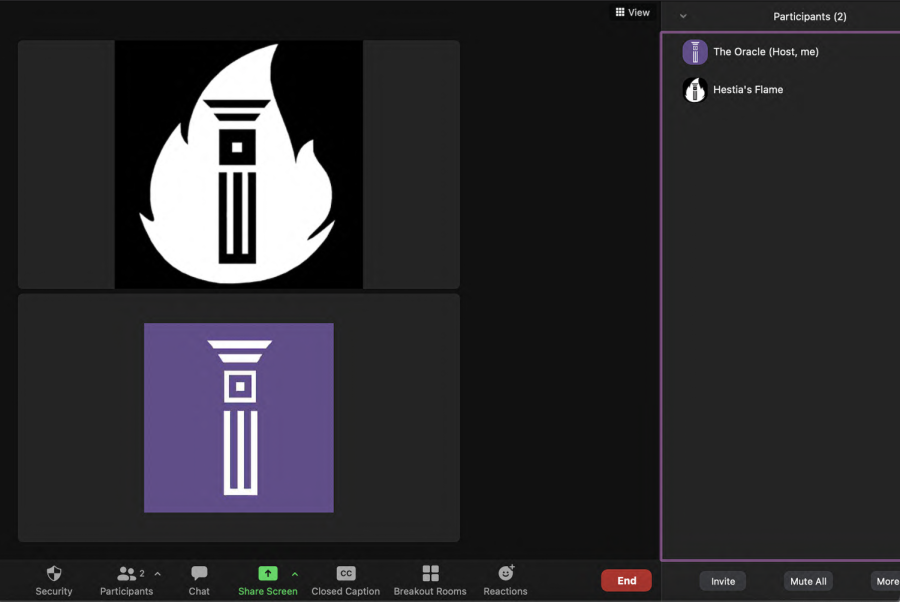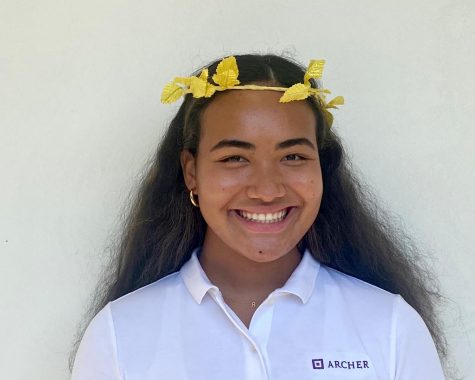#UnmuteYourself: Student-journalists share importance of Student Press Freedom Day
Photo credit: Vaughan Anoa’i
Archer’s student-run publications The Oracle and Hestia’s Flame participate in a Zoom call with one another, where both parties are unmuted. Thursday’s theme for Scholastic Journalism Week 2022 is #UnmuteYourself, encouraging student-journalists to interact with their favorite professional journalist or celebrity via social media. Thursday also marks Student Press Freedom Day, celebrating the privilege that is press freedom.
February 24, 2022
Do you know what prior review is? What does self-censorship look like? Which journalistic publications have press freedom? On the fourth day of Scholastic Journalism Week 2022, we celebrate Student Press Freedom Day. The goal of this day is to highlight the importance of press freedom within student publications and to demonstrate what press freedom looks like in action.
#UnmuteYourself theme calls upon the power of social media, as student-journalists have the opportunity to engage with the professional journalists that they look up to on platforms such as Twitter, Instagram or Facebook.
The Oracle and Hestia’s Flame are Archer’s student-run publications. Both groups have no prior review nor prior restraint as the publications do not undergo any sort of censorship or filtration on the part of the administration. These student-journalists work to share the honest and accurate opinions and experiences of their greater school community. News Editor Greta Irvine (’23) shared what press freedom means to her and how it impacts the work of student-journalists in this day and age.
“I think scholastic journalism is valuable because it amplifies the voices of smaller communities that aren’t covered as much in larger publications,” Irvine said. “I think it invites students to have a larger voice at an early stage in their life, because I do feel like young people have important opinions and perspectives on things that might not be as heard on larger publications in the world.”
Senior Quincy Gordon, co-editor-in-chief of Hestia’s Flame, said working within a student-run publication has taught her valuable lessons surrounding the importance of inclusivity and collaboration.
“I think it’s taught me the importance of one person’s voice, and then the importance of everybody’s voices together, and how significant it is to share everybody’s opinions, regardless of if you agree with them or not,” Gordon said.
Senior Staff Reporter for The Oracle Lizette Gonzalez (’23) said press freedom is a tool that all student-journalists should be afforded, as it allows them to produce journalistically-ethical pieces that are also factually accurate.
“Everybody deserves to be told the truth, so it’s frustrating to see other schools who don’t have the same thing [press freedom], because they deserve it as much as we do,” Gonzalez said. “Especially in areas that have censorship, it might be more needed to have those reporting skills to be honest with your reporting.”
New Voices is a student-run nonpartisan movement made up of state-based activists who work to protect student press freedom within state laws and legislation. In 2021, New Jersey became 15th state to ratify a New Voices law. Organizations like this one yearn to preserve and advocate for press freedom so that student-journalists everywhere can one day be afforded the same opportunity.
The second Editor-in-Chief of Hestia’s Flame is senior Sabrina Kim, distinguishing her second year serving in this position. Kim said student expression is a value that press freedom continuously promotes within student-run publications.
“I believe that student journalism is necessary because it’s important to have a diverse student forum for students to be able to express what they believe and what they feel without the fear of retribution,” Kim said.
Irvine said her work within The Oracle has translated into personal aspects of her own life, from the way that she consumes media, to fact-checking tactics. Irvine said she is grateful to the Archer community for affording herself, as well as every other student-journalist, the opportunity to cover the stories and topics that they are personally passionate about.
“It has definitely changed the way I engage with the world because I’m a lot more quick to catch bias or catch my understanding of how I’m consuming the media,” Irvine said. “I think that being able to share what I value and what I think is important to cover is a valuable power that I have, and I know it’s a big responsibility, and I appreciate that we have a community that allows me to do that without a lot of restraint.”









